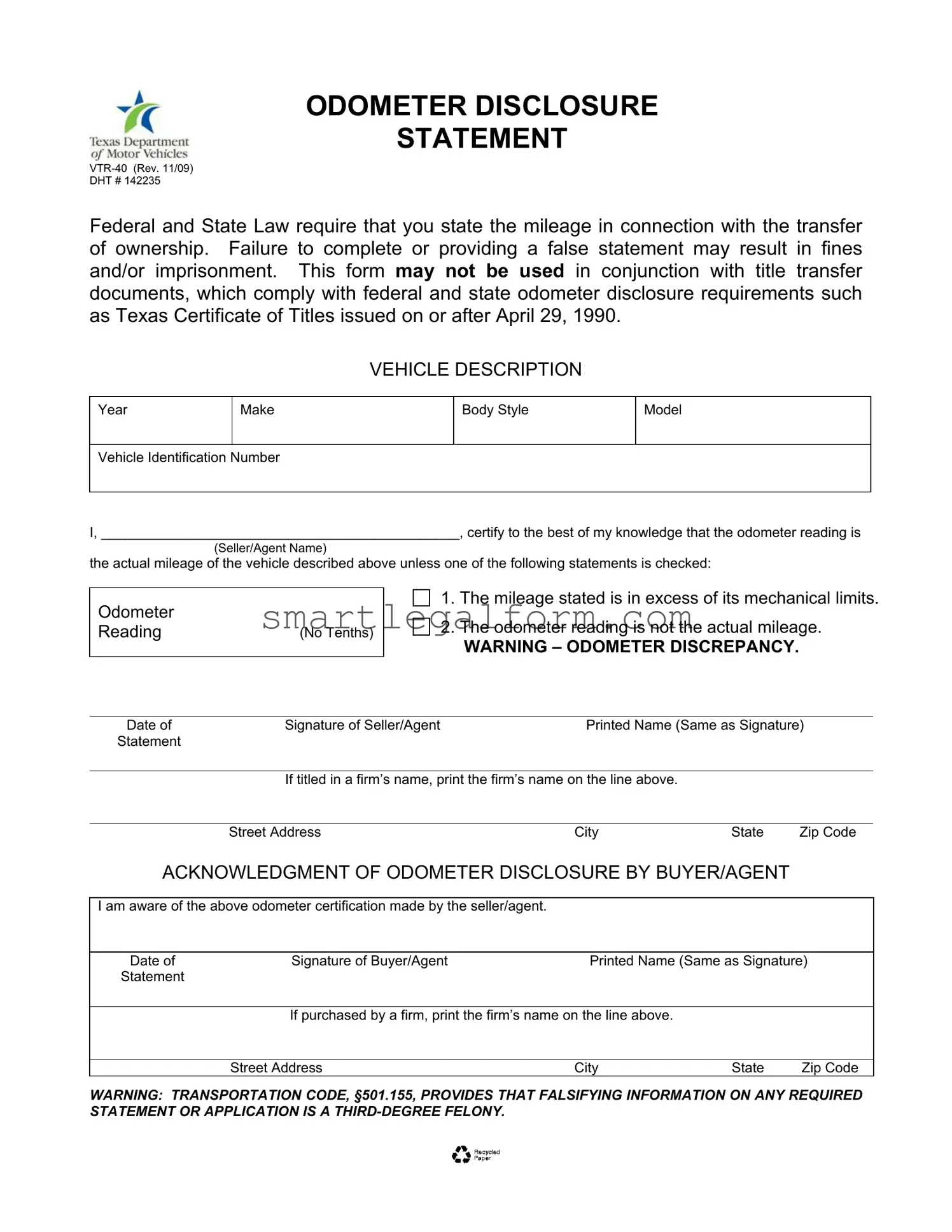Free Texas Odometer Statement Form
Form Preview Example

ODOMETER DISCLOSURE
STATEMENT
DHT # 142235
Federal and State Law require that you state the mileage in connection with the transfer of ownership. Failure to complete or providing a false statement may result in fines and/or imprisonment. This form may not be used in conjunction with title transfer documents, which comply with federal and state odometer disclosure requirements such as Texas Certificate of Titles issued on or after April 29, 1990.
VEHICLE DESCRIPTION
Year
Make
Body Style
Model
Vehicle Identification Number
I, ______________________________________________, certify to the best of my knowledge that the odometer reading is
the actual mileage of the vehicle described above unless one of the following statements is checked:
Odometer
Reading |
(No Tenths) |
1.The mileage stated is in excess of its mechanical limits.
2.The odometer reading is not the actual mileage.
WARNING – ODOMETER DISCREPANCY.
Date ofSignature of Seller/AgentPrinted Name (Same as Signature) Statement
If titled in a firm’s name, print the firm’s name on the line above.
Street Address |
City |
State |
Zip Code |
ACKNOWLEDGMENT OF ODOMETER DISCLOSURE BY BUYER/AGENT
I am aware of the above odometer certification made by the seller/agent.
Date of |
Signature of Buyer/Agent |
Printed Name (Same as Signature) |
Statement |
|
|
If purchased by a firm, print the firm’s name on the line above.
Street Address |
City |
State |
Zip Code |
WARNING: TRANSPORTATION CODE, §501.155, PROVIDES THAT FALSIFYING INFORMATION ON ANY REQUIRED STATEMENT OR APPLICATION IS A
Common mistakes
Filling out the Texas Odometer Statement form correctly is essential to ensure compliance with state and federal laws. One common mistake is failing to provide accurate odometer readings. The odometer reading must reflect the actual mileage of the vehicle. If the reading is incorrect, it can lead to legal issues for both the seller and the buyer.
Another frequent error involves not checking the appropriate boxes regarding the odometer's condition. The form includes options for stating if the mileage is in excess of mechanical limits or if the reading is not actual mileage. Neglecting to check one of these boxes when applicable can create confusion and potential liability.
People often forget to include their printed names as required. The form asks for the seller's or agent's printed name to match the signature. Omitting this detail can lead to complications in the transfer process and may raise questions about the validity of the odometer disclosure.
In addition, many individuals overlook the acknowledgment section for the buyer or agent. The buyer must sign and print their name to confirm awareness of the odometer certification. Failing to complete this section can result in disputes later on, especially if the vehicle's mileage is questioned.
Providing incomplete address information is another mistake that can have consequences. The form requires the seller's and buyer's street addresses, city, state, and zip code. Missing any part of this information can hinder communication and may affect the title transfer process.
Lastly, individuals may not fully understand the legal implications of falsifying information on the form. The warning at the bottom states that providing false information is a serious offense, classified as a third-degree felony. Awareness of these consequences is crucial when completing the form to avoid potential legal issues.
Dos and Don'ts
When filling out the Texas Odometer Statement form, it is important to adhere to specific guidelines to ensure accuracy and compliance. Below are four things to do and not do.
- Do provide the correct odometer reading without any alterations.
- Do ensure that all required fields are filled out completely, including the vehicle description and signatures.
- Do check the appropriate box if the odometer reading is not the actual mileage or exceeds mechanical limits.
- Do keep a copy of the completed form for your records.
- Don't provide false information or leave any fields blank, as this can lead to legal consequences.
- Don't use this form in conjunction with title transfer documents that do not meet federal and state requirements.
- Don't forget to sign the form, as both the seller and buyer/agent must provide their signatures.
- Don't ignore the warnings regarding penalties for falsifying information on the form.
Other PDF Documents
Irs Transcripts - The Sample Tax Return Transcript summarizes information required for financial planning or dispute resolution.
The FedEx Bill of Lading form serves as a crucial document for shipping goods. It outlines the agreement between the shipper and the carrier, detailing essential information such as service type, shipping addresses, and charges. This standardized form ensures that all parties are aware of the terms and conditions associated with the shipment, facilitating a smoother transportation process. For easy access to this document, you can visit documentonline.org/blank-fedex-bill-of-lading.
Creating a Lease Agreement - A security deposit is required upon signing, separate from any rents, serving as a safety for the Landlord.
How to Create a Family Crest - A unique coat of arms that tells the story of your family's history.
Similar forms
The Texas Odometer Statement form serves a specific purpose in vehicle transactions, particularly in disclosing the mileage of a vehicle being sold. Several other documents share similarities with this form in terms of their function and legal requirements. Here are six such documents:
- Vehicle Title Transfer Document: Similar to the Odometer Statement, this document also requires accurate disclosure of the vehicle's mileage at the time of ownership transfer. It ensures that both parties are aware of the vehicle's history and condition.
- Bill of Sale: A Bill of Sale outlines the terms of a sale and often includes the odometer reading. Like the Odometer Statement, it serves as a legal record of the transaction and helps protect both the buyer and seller.
- Odometer Disclosure Statement (Federal Form): This federal form is required for vehicle sales and is similar in purpose to the Texas Odometer Statement. It mandates that sellers disclose the odometer reading and any discrepancies, ensuring compliance with federal regulations.
- Vehicle Registration Application: When registering a vehicle, applicants must often provide the current odometer reading. This requirement aligns with the purpose of the Odometer Statement by confirming the vehicle's mileage for official records.
- General Power of Attorney Form: To understand the authority granted in this legal document, consider our detailed overview of the General Power of Attorney and its implications for financial management.
- Manufacturer's Certificate of Origin (MCO): This document is issued for new vehicles and includes the odometer reading at the time of the vehicle's first sale. It serves as a record of mileage and ownership, similar to the Odometer Statement.
- State Inspection Report: In many states, including Texas, a vehicle inspection report may include the odometer reading. This report ensures that the vehicle meets safety standards and provides another layer of verification regarding mileage.
